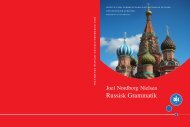[hprints-00683151, v2] Enea Silvio Piccolomini (Pius II ... - Hprints.org
[hprints-00683151, v2] Enea Silvio Piccolomini (Pius II ... - Hprints.org
[hprints-00683151, v2] Enea Silvio Piccolomini (Pius II ... - Hprints.org
You also want an ePaper? Increase the reach of your titles
YUMPU automatically turns print PDFs into web optimized ePapers that Google loves.
<strong>hprints</strong>-<strong>00683151</strong>, version 2 - 19 Mar 2013<br />
3.3. Splendour of Pavia and Milan<br />
[55] I do not attach importance to the contention that the Greeks ought to meet a<br />
grandiose Latin Church. But if this argument should carry any weight, then where<br />
can you find magnificence better than in Pavia? Just think of how honourably, how<br />
splendidly, how solemnly, and how extravagantly the duke would receive the<br />
Emperor of Constantinople 563 . Or is there any other man who lives in a more costly<br />
or magnificent fashion than this duke? An account of his largess would seem more<br />
stupendous than credible. When he shows generosity, he does it at his own behest.<br />
The Greeks will behold the grandeur of this prince with admiration and awe, and<br />
with their own eyes they shall see what they had already heard. Then they will<br />
acknowledge the truth of the Homerian saying that a reputation is never quite false<br />
if it is sung 564 by many people. 565 Here, indeed, they shall find that reality surpasses<br />
reputation. Sometimes the Greeks would go to Milan, and there they would see a<br />
large population, wealthy citizens, and great splendour; they would almost believe<br />
that what they see is another world! They would say that never have they seen so<br />
many artists nor so many fabulous events. So, if it is grandeur that makes the Church<br />
venerable, Milan would really be the best location. 566<br />
563<br />
Johannes V<strong>II</strong>I Palaiologos<br />
564<br />
I.e. praised<br />
565<br />
This is a direct quote from Leonardi Bruni: De Militia, 1422: Fama autem, ut inquit Homerus, nunquam penitus vana<br />
est, quam populi multi decantant. Bruni, p. 384. Cf. Homer: Odyssey, 19, 333-334: But if one be blameless and have a<br />
blameless heart, his fame do strangers bear far and wide among all men. Translation quoted after the Loeb ed. of<br />
1960. Cf. Peter Thiermann: Die Orationes Homeri des Leonardi Bruno Aretino, Leiden 1993, p. 385. According to<br />
Thiermann, the quote refers to Homer’s Odyssey, 24,196 ff.: Therefore the fame of her *Penelope’s+ virtue shall never<br />
perish, but the immortals shall make among men on earth a pleasant song in honour of constant Penelope. Quoted<br />
after the Loeb edition of 1960. The quote is a testimony of <strong>Piccolomini</strong>’s usage of Bruni, whom he much admired<br />
566<br />
Here <strong>Piccolomini</strong> possibly sends up a “test balloon” for the choice of Milan itself as the venue for the council. It<br />
would, of course, have been an international scoop for Milan, but it was quite out of the question as the other Italian<br />
powers would never agree<br />
113


![[hprints-00683151, v2] Enea Silvio Piccolomini (Pius II ... - Hprints.org](https://img.yumpu.com/16048892/113/500x640/hprints-00683151-v2-enea-silvio-piccolomini-pius-ii-hprintsorg.jpg)
![[hprints-00284881, v1] Musik i gymnasiet](https://img.yumpu.com/17715560/1/190x245/hprints-00284881-v1-musik-i-gymnasiet.jpg?quality=85)

